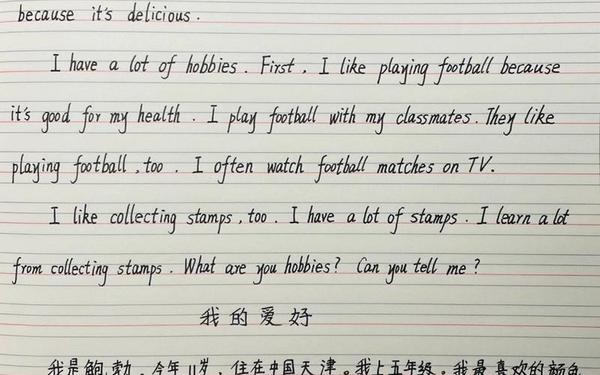1. 核心词汇区分
Hobby:指需要投入时间和行动的业余爱好(如集邮、弹琴、运动等),强调习惯性参与。
例句:Playing basketball is not only my hobby, but also a way to relieve stress.
Interest:指对某事物的兴趣或关注,可能不涉及实际参与(如对摄影感兴趣但未必常拍照)。
例句:Her interest in history led her to visit museums every weekend.
Passion:表示强烈热爱,常用于职业或长期追求(如音乐、写作)。
例句:His passion for painting started when he was five.
2. 具体活动词汇
运动类:play basketball/football, go camping, do yoga, jogging
艺术类:play musical instruments(如piano, guitar), collect stamps, paint
休闲类:read novels, surf the internet, watch movies, travel
技能类:cooking, coding, photography
3. 常用句型
表达兴趣:
I am interested in/into...(对…感兴趣)
I have a passion for...(对…有热情)
I find... fascinating.(觉得…有趣)
描述爱好:
In my free time, I enjoy...(空闲时我喜欢…)
One of my hobbies is...(我的爱好之一是…)
对比偏好:
I prefer hiking to shopping.(比起购物,我更喜欢徒步)
二、英语自我介绍中的兴趣爱好应用
1. 基础框架
结合性格:将爱好与个人特质关联,增强说服力。
例句:As an active person, I love sports like basketball and hiking, which keep me energetic.
突出亮点:选择与求职或社交场景相关的爱好(如团队运动体现合作能力)。
例句:Being a team player, I joined a local football club and learned the importance of communication.
2. 进阶技巧
用连接词丰富内容:
Not only do I enjoy reading, but I also write book reviews online.(不仅…还…)
结合长期目标:
My interest in environmental science motivates me to volunteer in sustainability projects.
量化成果:
I’ve collected over 200 stamps from 30 countries, which broadened my cultural perspective.
3. 完整范例
> 自我介绍片段:

> Hi, I’m Alex. In my spare time, I’m passionate about two things: photography and hiking. Not only do I enjoy capturing natural landscapes, but I also share my photos on social media to inspire others. Besides, hiking allows me to explore new places and stay physically active. These hobbies have taught me patience and creativity, which I believe are essential in teamwork.
三、注意事项
1. 避免笼统:少用泛泛的“I like music”,可改为具体类型如I’m into jazz and classical music 。
2. 匹配场景:面试时选择体现职业能力的爱好(如编程、设计);社交场合可更轻松(如旅行、美食)。
3. 文化差异:西方人更倾向主动型爱好(如运动),集邮、书法等需适当解释文化背景。

通过结合具体词汇、句型和场景化表达,能更生动地展示个人特点。如需完整兴趣列表或面试模板,可参考来源网页。



